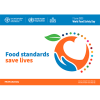As the global food industry continues to evolve, the importance of ensuring food safety has never been more critical. Various standards and certifications, such as GFSI, Organic, Global GAP, HACCP, and ISO standards, have been established to address different aspects of food safety. However, the proliferation of these diverse standards pose a significant challenge — especially for small businesses — in terms of cost, complexity, and overall compliance. In this article, we will explore the need for an integrated food safety management system (FSMS) that consolidates these standards into a comprehensive and unified framework.
Current Challenges in Food Safety Standards
The food industry is subject to a multitude of regulations and standards, each designed to address specific concerns related to food safety. The Global Food Safety Initiative (GFSI) aims to harmonize and strengthen food safety standards across the supply chain. Similarly, standards like Organic, Global GAP, HACCP, and ISO provide guidelines for organic production, agricultural practices, hazard analysis, and quality management systems, respectively.
While these standards individually contribute to enhancing food safety, their coexistence often imposes a heavy burden on businesses, particularly smaller ones. Each standard necessitates a separate certification process, involving costs related to preparation, audits, and ongoing maintenance. This fragmented approach can be overwhelming for businesses, leading to inefficiencies and potential gaps in compliance.
Cost Implications for Small Businesses
Small and medium-sized enterprises (SMEs) in the food industry face a unique set of challenges when it comes to adhering to multiple food safety standards. The financial implications of obtaining certifications for each standard can be prohibitive. For instance, a small-scale food producer dealing with organic products may also need to comply with GFSI standards for global market access.
Certification costs — including consulting fees, documentation, and audit expenses — quickly accumulate. Moreover, the need for ongoing compliance monitoring and updates can strain the already limited resources of smaller businesses. This situation raises concerns about the equitable access to global markets for businesses of all sizes.
The Role of an Integrated Food Safety Management System
The call for an integrated FSMS is rooted in the idea of streamlining and unifying the various standards to create a more accessible and efficient framework. By integrating these standards, businesses could achieve a single certification that covers multiple aspects of food safety, reducing the financial and administrative burden.
Integration can lead to a more cohesive approach to food safety, eliminating redundancies and ensuring a holistic understanding of potential risks throughout the supply chain. This not only simplifies the certification process but also facilitates better communication and collaboration among stakeholders, including producers, processors, distributors, and regulators. Benefits of an integrated FSMS include:
- Cost Efficiency. An integrated FSMS would significantly reduce the costs associated with multiple certifications. Businesses can allocate resources more efficiently, making certification attainable for a broader range of enterprises.
- Simplified Compliance. Streamlining standards into a unified system simplifies compliance efforts. Businesses can focus on meeting a comprehensive set of requirements rather than navigating the intricacies of various individual standards.
- Enhanced Food Safety. Integration ensures a more comprehensive and interconnected understanding of food safety risks. This can result in a more effective preventive approach, addressing potential hazards at various stages of the production and distribution process.
- Global Market Access. A single, globally recognized certification can facilitate market access for businesses, especially SMEs. This reduces barriers to entry and fosters fair competition in the global marketplace.
- Improved Collaboration. Stakeholders across the supply chain can better collaborate when operating under a common framework. Enhanced communication and information sharing contribute to a more resilient and responsive food safety ecosystem.
- Adaptability to Emerging Challenges. An integrated FSMS can be designed to incorporate emerging challenges and adapt to evolving risks in the food industry. This flexibility ensures that the system remains relevant and effective over time.
Challenges in Implementing an Integrated FSMS
While the benefits of an integrated FSMS are evident, the transition from the current fragmented system to a unified framework is not without challenges. Some potential hurdles include:
- Resistance to Change. Stakeholders accustomed to existing standards may resist the shift towards integration. Overcoming resistance through education and awareness campaigns is crucial for successful implementation.
- Technical Harmonization. Ensuring technical harmonization across different standards requires meticulous planning and collaboration. Consensus on common terminology, risk assessment methodologies, and other technical aspects is essential.
- Regulatory Alignment. Coordinating with regulatory bodies to align an integrated FSMS with existing regulations is necessary. This involves addressing legal and regulatory challenges to ensure widespread acceptance.
- Resource Allocation. Developing and implementing an integrated FSMS requires significant resources. Small businesses, in particular, may need support and incentives to make the transition feasible.
- Global Acceptance. Achieving global acceptance of an integrated FSMS may take time. International cooperation and agreement on common standards are vital to ensure recognition across borders.
The need for an integrated food safety management system is evident in the face of an ever-evolving food industry. As standards such as GFSI, Organic, Global GAP, HACCP, and ISO play crucial roles in ensuring food safety, their integration into a comprehensive framework is imperative. The benefits, including cost efficiency, simplified compliance, enhanced food safety, global market access, improved collaboration, and adaptability to emerging challenges, make a compelling case for the adoption of an integrated FSMS.
While challenges in implementation exist, the long-term advantages for businesses, consumers, and the industry as a whole outweigh the difficulties. Governments, regulatory bodies, industry associations, and businesses should collaboratively work towards the development and adoption of an integrated FSMS that strengthens food safety practices, fosters innovation, and promotes equitable access to global markets. In doing so, the global food industry can move towards a more unified and resilient future, ensuring the safety and quality of food products for generations to come.







